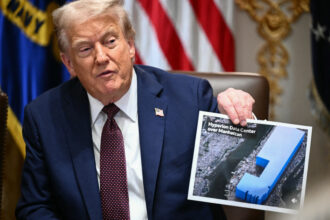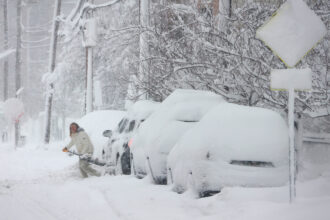by Alison Rourke, Guardian
Australia’s Green party is poised for a breakthrough moment in this weekend’s elections, cashing in on the incoherence of the major parties on an issue that has claimed more than one political scalp.
The Greens are predicted to win up to 14% of the vote according to opinion polls, nearly double what they polled last time. It is likely to give them control of the senate (which is elected by proportional representation), and potentially a seat in the lower house.
The party is benefiting from uncertainty on the left, and denial on the right, towards climate change.
The former prime minister Kevin Rudd lost the faith of the Australian public after referring to climate change as ”the greatest moral challenge of our times" – but then shelving his legislation on a carbon tax. His successor, Julia Gillard, seeking her own mandate in Saturday’s election, has been criticized for offering little more than a citizens’ assembly on the issue. Tony Abbott, the Conservative opposition leader, is a climate change skeptic, thrust into the leadership when former leader of the Liberal party Malcolm Turnbull fell on his sword over the emissions trading scheme.
The leader of the Greens, Bob Brown, says his party’s central message is action on climate change.
"There’s enormous frustration and disappointment with both the bigger parties at their infighting and their failure to lay out a vision for Australia," said Brown.
"If you don’t [vote Green], you’re voting for a do-nothing lot of big party politicians who simply don’t have the gumption to take reasonable action on climate change," he said.
The other reason for increasing interest in the Greens is that they have positioned themselves as the party of social action, calling for the legalization of same sex marriage (both major parties oppose this) and for more compassionate treatment of asylum seekers. Their rise in popularity has come predominantly at Labor’s expense.
"I think what we’re seeing is an element of Labor’s constituency who are impatient with the very prosaic and pragmatic approach that it’s taking and they’re decamping to a third party," says Dr Nick Economou, lecturer in politics at Melbourne’s Monash University.
In the inner city seat of Melbourne, the Greens hope to translate such support into their first seat in the lower house. Labor’s influential finance minister, Lindsay Tanner, is standing down, which gives the Greens a better chance of victory. The party candidate for Melbourne, Adam Bandt, says the result will be close.
"A lot has been forgotten, like the need to take urgent action on climate change. If seats start changing hands on the basis of values like compassion, sustainability and equality it’s really going to put those values into the national debate in a way that they’re currently absent," he said.
National opinion polls have repeatedly shown a majority of Australians want action on climate change.
Rudd shelved his legislation on a carbon tax in April after it was rejected three times in the senate, including by the Greens who said it did not go far enough.
Gillard said this week there won’t be a carbon tax under her leadership. Instead, she wants to invest in renewable energies and create a "citizens’ assembly" of 150 ordinary Australians to forge community consensus on climate change.
Abbott has promised there will never be a price on carbon if he wins office.
Instead, he’s promised a 15,000-strong "green army" of 18- to 25-year-olds who would earn about £170 a week helping community and church groups with environmental projects.
If the Greens win control of the senate on Saturday, it means they can block legislation. Whichever party wins, it will have to negotiate with them.
According to social researcher Hugh Mackay, this is a reflection of how society has changed: "What’s happened is that the world has caught up with the Greens. Suddenly their message is resonating with voters on a very large scale, whereas previously it was the eccentric fringe."
(Republished with permission)
About This Story
Perhaps you noticed: This story, like all the news we publish, is free to read. That’s because Inside Climate News is a 501c3 nonprofit organization. We do not charge a subscription fee, lock our news behind a paywall, or clutter our website with ads. We make our news on climate and the environment freely available to you and anyone who wants it.
That’s not all. We also share our news for free with scores of other media organizations around the country. Many of them can’t afford to do environmental journalism of their own. We’ve built bureaus from coast to coast to report local stories, collaborate with local newsrooms and co-publish articles so that this vital work is shared as widely as possible.
Two of us launched ICN in 2007. Six years later we earned a Pulitzer Prize for National Reporting, and now we run the oldest and largest dedicated climate newsroom in the nation. We tell the story in all its complexity. We hold polluters accountable. We expose environmental injustice. We debunk misinformation. We scrutinize solutions and inspire action.
Donations from readers like you fund every aspect of what we do. If you don’t already, will you support our ongoing work, our reporting on the biggest crisis facing our planet, and help us reach even more readers in more places?
Please take a moment to make a tax-deductible donation. Every one of them makes a difference.
Thank you,











